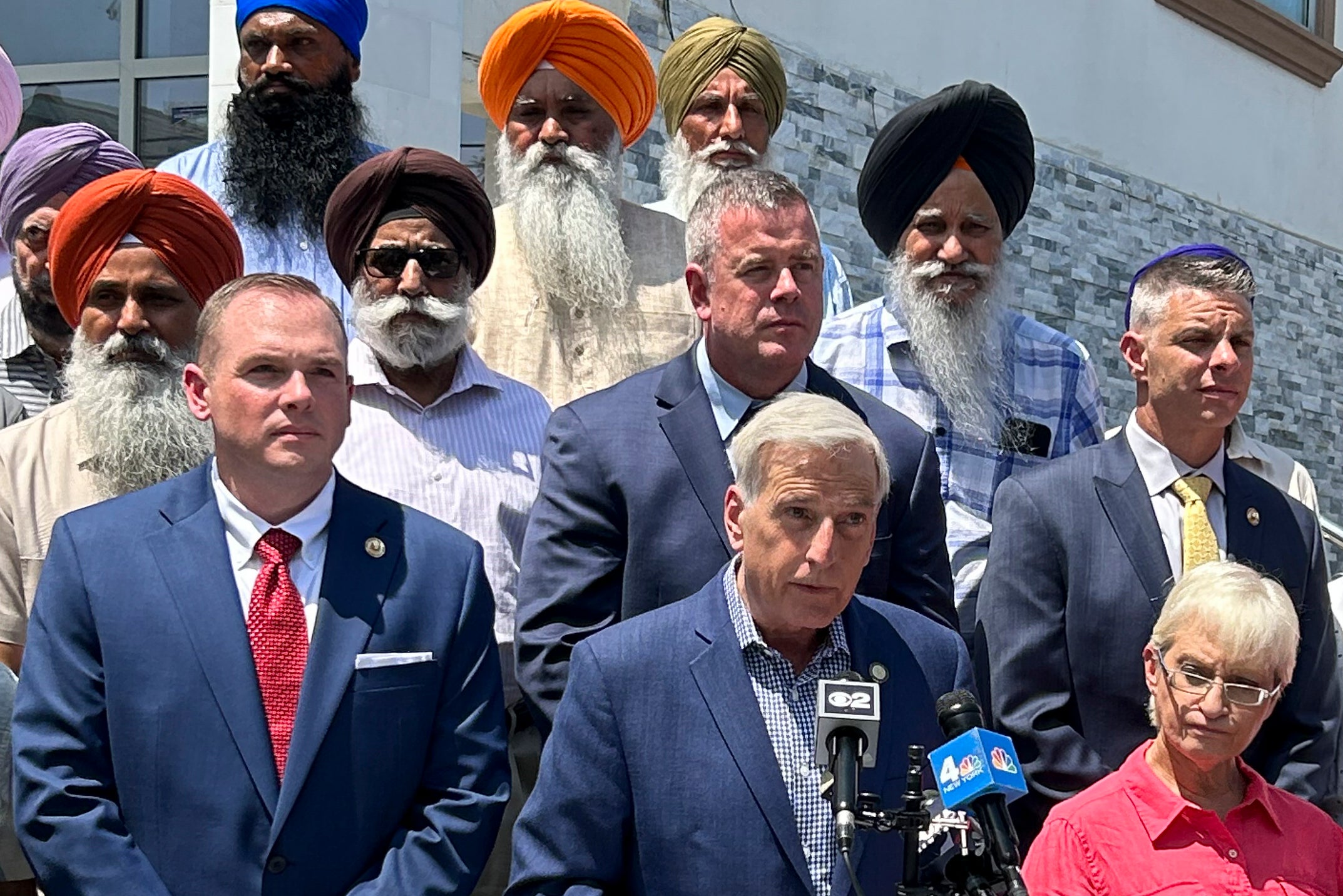After refusing to let Sikh trooper grow beard, New York State Police accused of flouting state law
A New York state trooper who is Sikh was barred from growing facial hair for his wedding, despite a 2019 state law requiring employers to let most workers follow grooming rules for their religion

Your support helps us to tell the story
From reproductive rights to climate change to Big Tech, The Independent is on the ground when the story is developing. Whether it's investigating the financials of Elon Musk's pro-Trump PAC or producing our latest documentary, 'The A Word', which shines a light on the American women fighting for reproductive rights, we know how important it is to parse out the facts from the messaging.
At such a critical moment in US history, we need reporters on the ground. Your donation allows us to keep sending journalists to speak to both sides of the story.
The Independent is trusted by Americans across the entire political spectrum. And unlike many other quality news outlets, we choose not to lock Americans out of our reporting and analysis with paywalls. We believe quality journalism should be available to everyone, paid for by those who can afford it.
Your support makes all the difference.A New York state trooper who is Sikh was barred by his supervisors from growing facial hair for his wedding, despite a 2019 state law requiring employers to let most workers follow attire or grooming obligations for their religion.
State Trooper Charanjot Tiwana, based in Jamestown, New York, requested permission to grow his beard to the length of one-half inch (1.27 centimeters) in March of 2022 for his wedding.
Unshorn hair and beards are a sign of religious commitment for practicing Sikh men, a custom that clashes with State Police grooming rules, which require troopers to shave and cut their hair short.
Tiwana's request was denied on the basis that it posed a safety issue regarding the use of a gas mask, according to his union, the New York State Troopers Police Benevolent Association.
Wearing a turban is also customary for Sikh men, but Tiwana has not formally asked for permission to don one on duty, in part because his requests to grow a beard were rejected, said the union's president, Charlie Murphy. He likened the denial to “persecution.”
“All New Yorkers, including law enforcement officers, must be free from employer oppression when practicing their religion,” Murphy said.
While the New York State Police did confirm that Tiwana put in a religious accommodation request, a spokesperson for the agency declined to comment on its outcome, including when or why it was declined.
“We value diversity, equity and inclusion among our ranks. As with every request for a religious or medical accommodation for any NYSP employee, we engage in the reasonable accommodation process,” said department spokesperson Deanna Cohen.
Tiwana, who has been a state trooper for six years, declined an interview request made through the union, which said it was speaking on his behalf. He didn’t return phone messages.
Many U.S. law enforcement agencies implemented rules in the early 20th Century banning facial hair, in part because of a desire to enforce a military-style look among officers. For almost as long, there has been debate over whether those rules are arbitrary, and have the effect of excluding certain religious and ethnic groups.
The New York State Police have struggled immensely with diversifying its workforce. In 2021, of more than 4,700 troopers, only 4% were Black and 6% Hispanic — compared to the 16% and 19% of the state population those groups constitute, the Associated Press reported.
In recent years, many police departments have eased various rules or encountered court actions that forced them to make changes.
Detroit’s police force started letting officers wear beards in 2016. Many departments, including Philadelphia’s, began letting officers grow short beards if shaving was likely to lead to ingrown facial hairs, a condition common among Black men. In 2021, the police department in Newark, New Jersey, began allowing Muslim officers to wear the hijab, a headscarf, while on duty. Sikh officers in New York City have been allowed to wear turbans, rather than traditional police caps, since 2016.
In 2022, a federal court ruled U.S. Marine recruits who are Sikh can keep their beards when they train at bootcamps.
The New York State Police are currently working on a policy regarding turbans, according to Cohen.
A state law passed in 2019 requiring all New York employers — including state agencies — to accommodate workers with religious requirements for attire or facial hair, as long as those requirements didn't interfere with crucial job duties. When passed, the law pushed employers to review and update their policies for grooming and dress code.
State Assemblyman David Weprin, who sponsored the 2019 state law, said he was “shocked” when he heard about Tiwana being denied religious accommodations.
“This is something that has been litigated and accommodations have been made in almost every agency,” Weprin said in a phone interview.
Numerous troopers within the state police force have been granted facial hair exemptions related to their duty assignments for non-religious reasons, according to the union representing troopers.
“No one should be compromising their religion to serve their country," said Gurvinder Singh, a New York Police Department sergeant and president of the Sikh Officers Association at a related news conference on Sunday. “Hopefully one day you will see whole turban and bearded Sikhs as New York State troopers.”
___
Maysoon Khan is a corps member for the Associated Press/Report for America Statehouse News Initiative. Report for America is a nonprofit national service program that places journalists in local newsrooms to report on undercovered issues. Follow Maysoon Khan on Twitter.